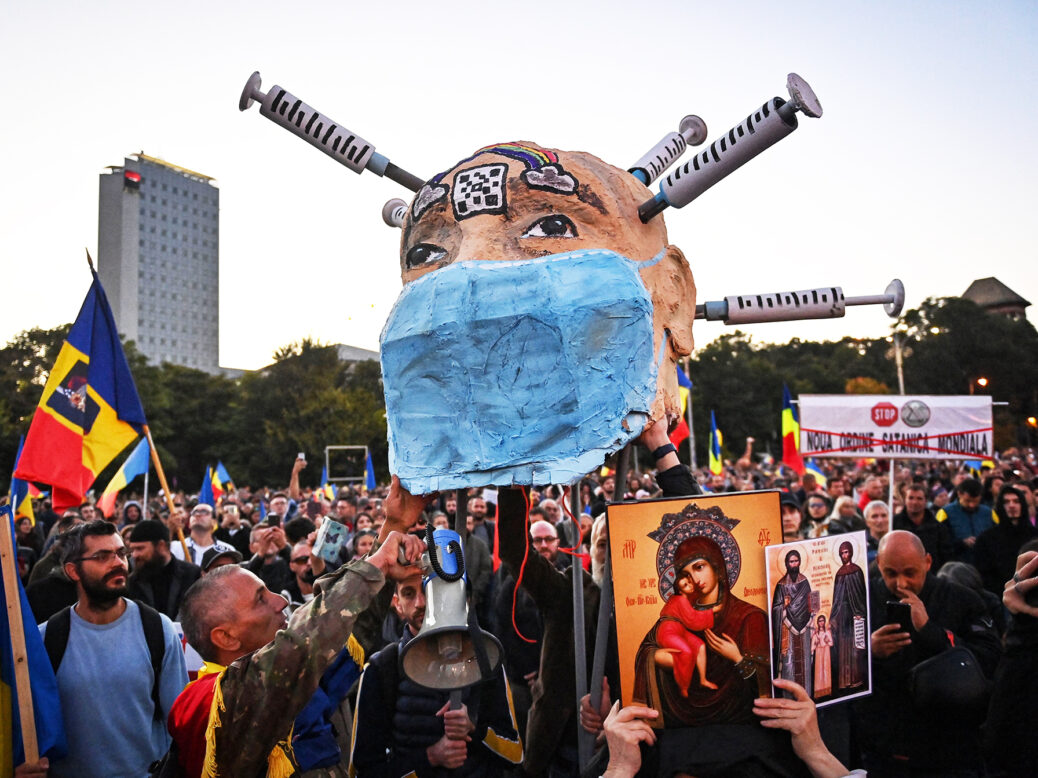
With Covid-19 cases and deaths surging to the highest levels in the EU, on 20 October Romania’s president decreed strict new measures: vaccination certificates for most activities, mandatory masks on the street, and only vaccinated people would be allowed to leave their homes after dark. Rates for full vaccination lie at about 32 per cent – and “lie” may be the operative word. Vaccine scepticism is rife in Romania. Doctors report patients asking for sham vaccination certificates, and a new term has entered the language: “sink” vaccinations, so-called because the contents of the syringe go down the drain, not into an arm.
Romania is the worst affected, but it is far from unique. Across south-eastern Europe, vaccine take-up is low and suspicion of the authorities is high. In Serbia, 43 per cent are fully vaccinated against Covid-19; in Bulgaria, 21 per cent; and in Bosnia-Herzegovina just 15 per cent.
This scepticism is rooted in history and reinforced by experience. During the Communist era, the authorities were seen as harsh and their decisions arbitrary. Some of the governments elected after 1989 and the fall of the Iron Curtain were little better. Corruption was widespread. There was little reason to trust the state, for health advice or anything else.
“People don’t trust the state to act in the interest of the common good,” observes Professor Florian Bieber, director of the Centre for Southeast European Studies at the University of Graz, in Austria. “They don’t trust the messages coming from the state or even experts. They believe these are all driven by selfish interests.”
The governments themselves have done little to alleviate suspicions. Serbia imposed draconian measures in the first few months of the pandemic, including curfews on several weekends lasting from Friday night until Monday morning. However, there were no such restrictions on rallies ahead of local elections in June 2020, which were conveniently won by the ruling party. A month later, demonstrations against a proposed new curfew became wider protests against the government itself.
“The arbitrariness with which some governments used these measures to silence their critics and opponents is the most troubling feature of the trend,” write Beata Huszka and Tania Lessenska in a Western Balkans policy brief for the European Council on Foreign Relations.
More bluntly, says Bieber: “People feel like they were taken for a ride.”
Conspiracy theories find fertile ground and flourish. Faced with a chaotic or indifferent official response, it can be preferable to believe that someone, somewhere, has a plan, however malign. This is nothing new: in pre-1989 Albania and Yugoslavia, governments promoted the idea of encirclement by hostile forces that could attack at any time.
When people don’t trust the official sources of information, they look for alternatives. Scepticism of Western medicine is widespread: people turn instead to folk remedies or alternative medicine. Believing the official line – or not – becomes a marker of identity. “People who might be hostile to the government for good or bad reasons are rejecting the vaccine or are sceptical because they see it as implicit support for the government,” Bieber says.
And these views are not confined to the fringes. Tennis champion Novak Djokovic is a hero to many Serbs: he doesn’t want to be described as an anti-vaxxer but has said he’d rather miss the Australian Open in January than reveal his vaccination status.
Djokovic subscribes to other clusters of beliefs that are commonly found together: Serb nationalism and alternative medicine. He has used natural remedies (unsuccessfully) to treat an elbow injury, and was recently photographed with a Bosnian war veteran who’d been convicted of crimes against humanity.
Serbia has authorised the Chinese and Russian vaccines against Covid-19. Those who oppose the West can choose a jab that complements their politics. The EU has also provided vaccines to the region, but it has done so in partnership with governments. Those who are disillusioned with promises unfulfilled about Serbia’s European future are unlikely to be won over.
This mistrust of official medical advice predates the pandemic. From 2017-18, an outbreak of measles swept the region. In Serbia, where anti-vaxxers have a large following, 14 people died. The infection rate per capita was the highest in Europe, with more than 600 cases per million people. Measles is highly contagious, but also preventable. The virus found its way to those who hadn’t been vaccinated, whether because of conviction, patchy immunisation campaigns or the upheaval of war.
“South-eastern Europe is a society that lost its orientation in many ways after 1990,” Bieber says. The appeal of conspiracy theories “had a lot to do with the upheaval that people experienced in their own lives: war, state dissolution and uncertainty. The obvious explanation that this is the result of bad politicians doing terrible things, for whatever reason, is often not very satisfying” to people in search of answers.
Those terrible things can sometimes involve questionable contracts. In Bosnia, a multimillion contract for ventilators went to the owners of a raspberry farm, even though the manufacturers warned that the equipment wasn’t suitable for critically ill patients. There was outrage at the news, but also apathy. Too many people expected nothing more.
Social and personal vulnerabilities alike have been laid bare by the pandemic: inequality between those who could work from home and those who could not; the cost and pressures of providing childcare; or the loneliness faced by many who had to shield for health reasons. In south-eastern Europe, the pandemic has shown up the chasm of distrust separating governments from the governed. The victims of Covid-19 have fallen in.
[see also: Is vaccine hesitancy hindering the global roll-out?]





